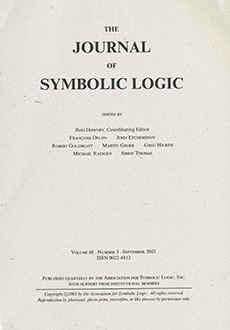Abstract
Kummer's Cardinality Theorem states that a language A must be recursive if a Turing machine can exclude for any n words w₁, …, wn one of the n + 1 possibilities for the cardinality of {w₁,…,wn} ∩ A. There was good reason to believe that this theorem is a peculiarity of recursion theory: neither the Cardinality Theorem nor weak forms of it hold for resource-bounded computational models like polynomial time. This belief may be flawed. In this paper it is shown that weak cardinality theorems hold for finite automata and also for other models. An explanation is proposed as to why recursion-theoretic and automata-theoretic weak cardinality theorems hold, but not corresponding ‘middle-ground theorems’: The recursion- and automata-theoretic weak cardinality theorems are instantiations of purely logical weak cardinality theorems. The logical theorems can be instantiated for logical structures characterizing recursive computations and finite automata computations. A corresponding structure characterizing polynomial time computations does not exist.
Citation
Till Tantau. "Weak cardinality theorems." J. Symbolic Logic 70 (3) 861 - 878, September 2005. https://doi.org/10.2178/jsl/1122038917
Information





